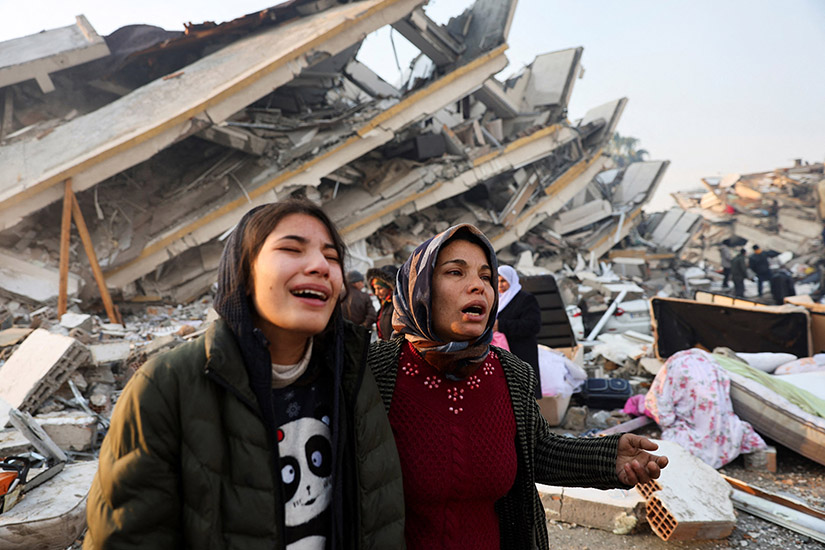It seemed that 12 years of a bloody war should have been enough tragedy for the people of Aleppo and other Syrian cities. But in the early hours of Feb. 6, a devastating earthquake struck northwestern Syria, killing 1,500 as of 5 a.m. Eastern on Feb. 7.
In southern Turkey and Syria combined, the death toll reached more than 11,000 as of early morning hours on Feb. 8 and is expected to rise as people are still trapped under the rubble.
 Earthquake survivors reacted while standing amid destroyed buildings in Hatay, Turkey, Feb. 7.Photo Credits: Umit Bektas | ReutersIn Aleppo, people are trying to pick up the pieces after the shock of the catastrophe.
Earthquake survivors reacted while standing amid destroyed buildings in Hatay, Turkey, Feb. 7.Photo Credits: Umit Bektas | ReutersIn Aleppo, people are trying to pick up the pieces after the shock of the catastrophe.
“It’s a desperate humanitarian situation,” Chaldean Catholic Bishop Antoine Audo of Aleppo, and former president of Caritas Syria, told OSV News.
Even before the catastrophe, there were electricity and fuel shortages in Syria’s second-largest city of more than 2 million people.
“There is no electricity, there is no fuel, the winter is very harsh, and it is cold inside and outside. There is so much poverty,” Bishop Audo said, underlining that “on top of all that, we have to face this earthquake. It’s not easy. The situation is really terrible.”
By early morning on Feb. 6, following the earthquake, the bishopry (bishop’s residence where offices are often located) was hosting about 50 people, including children: “We prayed together, and we had some tea.”
Bishop Audo explained that people who live on the above-ground floors in apartment buildings do not feel safe. “It is dangerous, especially if there is another earthquake or aftershocks.” In fact, a second earthquake struck early afternoon on Feb. 6.
The Chaldean Catholic bishop said the churches of different rites are organizing centers to provide food and water. “This is the first step of help in this tragedy,” he said.
After almost 12 years of a deadly war in Syria, the earthquake came on top of the suffering its people had already experienced.
“I am from Aleppo, and it’s the first time I experienced a dangerous tragedy of an earthquake,” said the 77-year-old bishop. “I thought it was the end for me.”
Maronite Bishop Joseph Tobji of Aleppo referred to the earthquake as “the biggest terror.”
“I didn’t experience anything like this in all the years of war,” Tobji told OSV News. “People are shocked and crying,” he said.
Sandy Agob, a 29-year-old Maronite Catholic from Aleppo, told OSV News that since 4 a.m., when the earthquake struck, they were “living in horror.”
“I’m so scared, but thank God we are okay,” said Agob, who lives with her parents in a ground-floor apartment. “Today was the worst day ever. Worse even than the war. You realize that in a single moment, there’s just a thread between your life and death,” she added.
Shaken by the earthquake, Agob shared what she told her parents immediately after the tragic shock: “Why do people (in the world) have problems with each other, while life is so fragile that it can be just taken away in seconds?”
Sleeping at the time of the earthquake, Agob said she heard her parents shouting to come to them and that in their apartment, “everything was moving and broken.”
The first quake, which she said lasted four minutes, “was so long.” They “couldn’t stand up, so we sat on the floor” in the entryway to the bathroom, trying to keep safe, Agob said.
“I kept praying, praying, praying, holding a picture of Jesus and Mary. Thank God, He protected us,” she said. Hearing the crashing sounds of stones falling outside, Agob recounted that she thought: “We are going to be killed.”
“But God saved us,” she said.
“I really don’t know why God is testing us with this earthquake, because we had enough problems in the war,” Agob said of the catastrophe. “We hope to live peacefully and not to be afraid of losing our life,” she added.
The Pontifical Mission Societies in the United States has opened the Earthquake Aid for Turkey and Syria Fund “to provide immediate relief to the families that suffered catastrophic loss due to the earthquake that shook Turkey and Syria Monday morning,” the organization said in a statement.
Proceeds from the fund will support missionary priests, religious women and lay missionaries on the ground providing assistance to those impacted by the disaster, defined by Bishop Audo as a “tremendous bomb.”